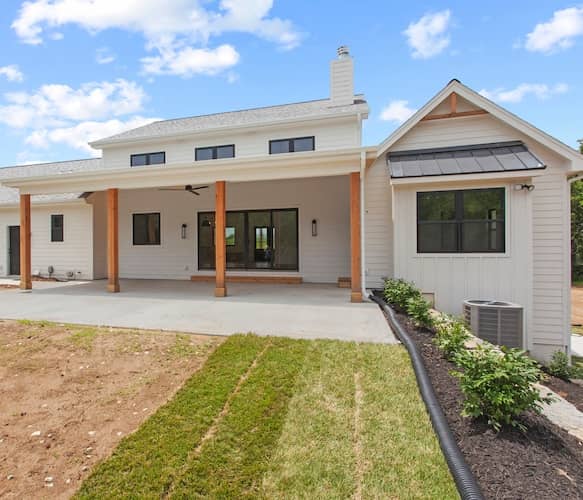Builder's risk insurance: What is it, what does it cover and should you get it?
Mar 1, 2024
•6-minute read
Whether you’re a commercial real estate investor or a homeowner with a vision, builder’s risk insurance can protect you from financial damage due to catastrophes or accidents during a construction project.
In some cases, builder’s risk insurance may be mandatory for you because of city or county law. However, even if it’s not required, you may want to protect yourself financially while you build your forever home or begin a significant renovation. The following information will give you a better idea of what builder’s risk insurance is and how it can help you.
What is builder’s risk insurance?
Builder’s risk insurance is a unique insurance policy that covers buildings during construction projects, renovations and remodeling. This kind of insurance may also be referred to as:
- Home builder’s insurance
- Contractor’s all-risk insurance
- Course of construction insurance
Builder’s risk coverage is available for residential properties, commercial properties, and other property types.
Parties listed on the policy are insured against damages or losses caused by hazards such as:
- Fires
- Storms
- Hail
- Lightning
- High winds
- Vandalism
- Contamination
- Explosions
- Collisions
Builder’s risk insurance isn’t a standard policy, so the coverage can vary greatly. Some policies will extend to construction materials, documents, data and temporary structures. Policies can also protect against injury claims from non-employees and the cost of fixing or replacing damaged equipment.
Types Of Builder's Risk Insurance
There are four main types of builder’s risk insurance, though others might be available under certain circumstances.
Single project policy: Also known as a location-specific or one-shot policy, this is the most common type of policy, as it is for property owners with one project going at a time, This is what you’ll want if you have a new office building being built or renovations being made on your home.
Reporting form policy: This policy is for contractors and homeowners with two or more projects going on at once with a value of up to $3 million.
Blanket deposit policy: This is for contractors who have numerous projects, usually an average of 25, going every year. Reporting each project isn’t necessary, as they are all covered under the blanket deposit.
Blanket installation policy: This policy is reserved for trade contractors carrying out extensive, and expensive, projects.
What does builder’s risk insurance cover?
A builder’s risk insurance policy protects your construction project from various types of property damage. Many builder’s risk insurance providers cover the direct effects, like damaged construction materials, and indirect effects, like loss of revenue, caused by property-related damages during construction.
Below are some examples of risks that home builder’s insurance policies can cover.
- Damages: Damage to the job site as a result of vandalism, fire, lightning, hail, high winds, smoke, theft, explosions, vehicle collisions, and acts of God, such as hurricanes or earthquakes.
- Materials: Construction materials damaged or lost in transit, documents and data such as blueprints or project plans, and temporary structures like scaffolding, fencing, signage, and retaining walls. The property itself is also insured.
- Comprehensive general liability: Claims from non-employees of bodily injury while on the construction site.
- Equipment: The cost of fixing or replacing construction equipment.
- Financial loss from construction delays: Rental income, real estate taxes, sales income and more paid interest on loans.
- Projects: New construction projects, remodels, home additions, and installations on residential and commercial properties.
Hard costs vs. soft costs
The costs incurred by different types of damages are also referred to as hard and soft costs. Hard costs are associated with damages to physical property during a construction project, like the building structure, equipment, and materials.
Soft costs are the additional costs incurred because construction was delayed due to a covered loss. Soft costs include insurance premiums, real estate taxes and fees for engineers, accountants, architects, and building consultants.
What does builder’s risk insurance not cover?
Beware that builder’s risk policies don’t cover everything. An extension or additional insurance policy may be necessary to ensure adequate coverage of your building project. Here are the most common exclusions from home builder’s insurance policies:
- Workers’ compensation claims
- Accidents (which construction liability insurance more likely covers)
- Wear and tear
- Acts of terrorism and war
- Employee theft
- Rust and corrosion
- Mechanical breakdowns
- Damage due to faulty design
- Workmanship and materials
Who should have a builder’s risk insurance policy?
Builder’s risk insurance benefits anyone with a financial interest in a construction project or property renovation. Those who stand to lose financially during construction should be on the policy. Additionally, your municipality may require a builder’s risk policy to grant you a building permit or approval.
Typically, your general contractor will purchase the home builder’s insurance policy to ensure that it covers the project sufficiently. However, the purchase agreement between you and the contractor may state that the building owner or buyer has to purchase the policy.
However, numerous parties associated with the project will benefit if you include them in the policy. These individuals include:
- Property owners
- Architects or engineers working on the project
- Contractors or subcontractors
- Development or investment companies
- Building owners
- Real estate investors
- Lenders
- Home builders
How much does builder’s risk insurance cost?
Builder’s risk insurance typically costs 1% – 5% of the total construction project budget. So, if the construction budget is $200,000, you will likely end up spending $2,000 – $10,000 on builder’s risk insurance, depending on the scope of work.
If you’re planning to build your home, you could save money by implementing a few inexpensive ways to build a house to lower your overall construction budget.
The following factors can affect the cost of your builder’s risk insurance policy:
- Project cost and location
- Project timeline
- Square footage of the construction site
- Your contractors’ and subcontractors’ expertise
- Amount of coverage
- Quality of construction materials
- Project logistics, such as the location where materials are stored
Coverage Add-Ons
If your policy does not provide the full coverage you need, you can enhance your policy with coverage add-ons and optional endorsements. Add-ons vary by provider, so shopping around will help you understand how you can cover different assets and liabilities.
Because every project and every policy is different, some companies allow you to customize your policy to fit your needs. Common add-ons and extensions include protection for:
- Flood damage
- Wind and storm
- Construction forms
- Temporary structures
- Debris removal and disposal in the event of a loss
- Pollutant cleanup
- Sewer backup
How do you get home builder’s insurance coverage?
It’s ideal to speak with an experienced insurance broker about your construction project. An effective insurance broker will evaluate each detail of the project, from the location to the type of transit used to move materials. Then, they’ll give you a tailored policy based on all the contributing factors.
Let’s go over the steps for securing builder’s risk insurance in more detail.
Determine the scope of your project
If you want to save time and money with your construction project, define the size of the building and your general plan for the project. You’ll need to ask questions and do your homework to know how much it will cost to build a house. Giving your project shape and definition will help you know what you need to cover through your builder’s risk insurance policy.
Buy from an insurance agent or broker
Insurance brokers and agents are a great resource to begin your search for a builder’s risk insurance policy. Brokers and agents will connect you to the right insurance policy based on your needs.
Brokers aren’t the companies that are financially backing or underwriting the policy. However, their relationships with insurance providers allow them to match you with the right policy at an affordable price. Therefore, putting an insurance broker to work can save you time and energy. Keep in mind that brokers charge fees for their services, so be sure to understand what you’ll pay the broker before enlisting their help.
Work directly with an insurance provider
You can also purchase a builder’s risk insurance policy directly from an insurance company. Working with an insurance company will let you obtain a policy tailored to your project. Be aware that the company may limit the kind of coverage you receive. It’s a good idea to shop around and check out different insurance providers, just like you would when shopping for mortgage lenders and comparing interest rates.
Most insurers write builder’s risk insurance policies on an inland marine form rather than a standard property insurance form. This form allows for a broader range of coverage that the insurer can adapt specifically for your project.
Check the provider’s rating
Builder’s risk insurance is highly specialized. When shopping for a policy, check out companies that are A-rated or higher by AM Best, a global credit rating firm that ranks insurance companies based on their financial stability.
Understand the terms of your insurance policy
Before you sign on the dotted line, review the policy and be sure to discuss any areas of concern before purchasing the plan. Remember, some policies may have exclusions. You may need to purchase a coverage add-on or otherwise address your coverage needs before construction begins.
Knowing when your coverage begins and ends is vital. Some policies won’t have specific coverage dates; the coverage may begin or end with certain approvals or permits. Before purchasing a plan, understand which milestones in the construction process can trigger a change in your policy coverage.
Do i need home builder’s insurance if i have homeowners insurance?
There is some overlap between builder’s insurance and homeowners insurance, but the latter typically does not cover damage during construction or major renovations. Homeowners insurance generally covers the house itself and your belongings, as well as personal liability in case of injury, whereas home builder’s insurance will cover the building materials and equipment both on- and offsite.
It’s wise to carefully consider both insurance policies to make sure any unexpected issues are covered.
The bottom line: Builder’s risk insurance makes sense for some
Whether you’re building your dream home or a room addition, you’ll want to insure the construction process from top to bottom. General contractors and homeowners alike can benefit from builder’s risk insurance for their construction projects. Partnering with an experienced insurance broker or company will give you an added sense of security and help make your vision a reality.
Rocket Mortgage® doesn’t offer construction loans at this time. However, we do provide alternative loan products – like our Home Equity Loan – that could help you finance a home renovation or project. Speak with one of our Home Loan Experts and start your application today.

Ashley Kilroy
Ashley Kilroy is an experienced financial writer. In addition to being a contributing writer at Rocket Homes, she writes for solo entrepreneurs as well as for Fortune 500 companies. Ashley is a finance graduate of the University of Cincinnati. When she isn’t helping people understand their finances, you may find Ashley cage diving with great whites or on safari in South Africa.
Related resources

5-minute read
Your guide to blue tape walk-throughs
The blue tape walk-through of your newly constructed home is an important step before you move in. Learn more about what it entails and what to check for.
Read more
9-minute read
Construction loans: Everything you need to know
Always dreamed of building a custom-tailored home? A construction loan could help to make that a reality. Learn what construction loans are and how they work...
Read more

7-minute read
Buying a new-construction home
Buying a new-construction home can help you get the place of your dreams. Learn about the process, costs, benefits, and drawbacks so you know what to expect.
Read more